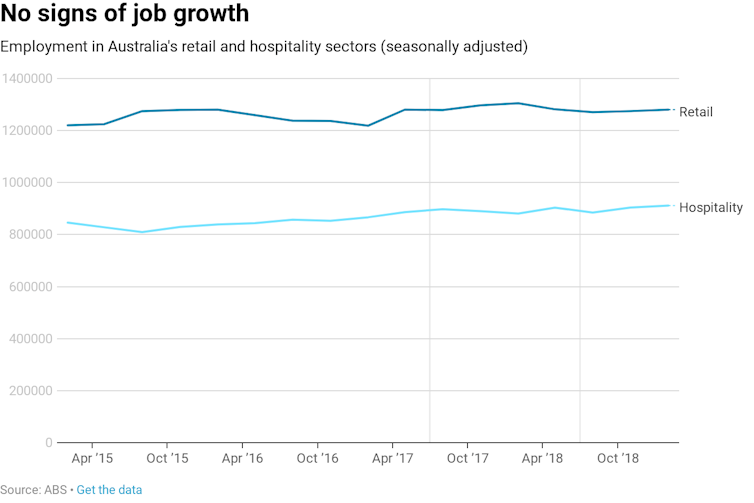July 16, 2019
UOW Economists awarded for contribution to policy debate
Economics paper offers robust evidence for impacts of penalty rate cuts on employment outcomes in retail and hospitality.
Research that was publicly criticised as not worthy of publication by those on the opposite side of a contentious Fair Work Commision case has not only been published in a top academic journal, it has gone on to win their best paper award for 2018, which was awarded at the Australian Conference of Economists hosted by the Economic Society of Australia.
Associate Professor Martin O’Brien led work that addressed politically and socially contentious economic policy: weekend and public holiday penalty rates for hospitality and retail workers.
The Fair Work Commission decided in 2017 to decrease the penalty rates paid to retail and hospitality workers on the safety-net award for working on Sundays and public holidays.
The argument behind the change was that the extra wages were unaffordable for many small businesses in the sector and the award was out of touch with the modern reality of shopping and dining out on Sundays.

Associate Professor Martin O'Brien. Photo: Paul Jones
Politically, the argument was that cheaper wages would mean more jobs.
“To be fair, it was clear that Commissioners were hampered in their decision-making back in 2017 because of the lack of empirical analysis of the effect of penalty rate changes on employment outcomes in Australia and internationally,” Professor O’Brien said.
“We set about to address this situation by collecting comprehensive survey data measuring the impact of the penalty rate cuts on employment outcomes.”
Associate Professor O’Brien and his collaborators Professor Raymond Markey (Macquarie University) and Dr Eduardo Pol (UOW) surveyed retail and hospitality workers the month before and after the 1 July 2017 penalty rate decrease.
"This award vindicates the strength of our research and we hope it will play a significant role in future Fair Work Commission cases in Australia and minimum wage cases internationally."
An early working paper presented at a 2017 conference found little evidence the cuts had the desired effect. There was no statistically significant increase in employment on Sundays in the retail and hospitality workforce after the penalty rate was introduced.
In addition, the average number of hours worked on Sundays for existing employees remained steady at approximately six hours.
This also meant there was no increase in average weekly hours worked by employees affected by the penalty rate cuts. In essence, of all of the positive employment effects put forth by employers in the Fair Work Commision case, and supported by the Commission’s decision, none were supported by the data.
Through sophisticated statistical analysis Associate Professor O’Brien found that labour demand was extremely inelastic in this case, with labour demand (the number of jobs) not responding to the decrease in wages on Sundays.

Critics rounded on the research, suggesting the researchers must have been biased, collected data from union members only, and wanted to reach a predetermined conclusion (none of which was true).
Why were no jobs created? “One inescapable conclusion is that the evidence presented to the commission was flawed,” he said.
For one, none of the expert evidence submitted to the Commission contained sound empirical analysis of the employment impact of penalty rates.
Much of the evidence in support of penalty rate cuts consisted of employer intentions surveys and hypothetical conjecture.
The resulting analysis was compiled in the 2018 paper – ‘The Short Run Impact of Penalty Rate Cuts on Employment Outcomes in Retail and Hospitality Sectors in Australia' – and published in the journal Economic Papers.
This week it won the Best Paper award for 2018.
“Our ongoing research shows that the expected increase in employment from penalty rate cuts was not forthcoming. There are simple economic reasons why this was not the case such as record low wage growth restricting families’ disposable income and purchasing power, and retail and hospitality industries were particularly vulnerable to this lack of spending” Professor O’Brien said.
“Unfortunately, some journalists and academics with vested interest on the employer side have attacked us in the media because of these research findings, choosing their ideological beliefs over hard data and research analysis.
“It is really satisfying that this award vindicates the strength of our research and we hope it will play a significant role in future Fair Work Commission cases in Australia and minimum wage cases internationally.”
The award citation says the paper “represents a significant and timely contribution to academic and policy debates around the pros and cons of reducing penalty rates against the backdrop of Australia’s social and economic landscape.
“It has achieved a crucial first step in modelling potential changes to employment outcomes as a result of this policy shift. Overall, it delivers a robust and much-needed evidence base that overcomes the dearth of empirical findings on the labour market impacts of penalty rate cuts in Australia.”
